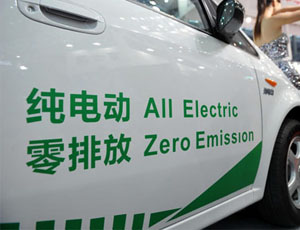Electric Vehicles Receive Tax Exemption in China
 SHANGHAI – China will waive the 10 percent vehicle purchase tax for “new energy vehicles” beginning September 1, in a bid to boost demand for electric vehicles and address pollution problems.
SHANGHAI – China will waive the 10 percent vehicle purchase tax for “new energy vehicles” beginning September 1, in a bid to boost demand for electric vehicles and address pollution problems.
The tax break applies to both locally produced and imported electric cars, plug-in hybrids and fuel-cell vehicles, and will last until the end of 2017.
The exemption is China’s latest measure to expand the country’s electric vehicle market, which it identifies as a crucial step towards addressing environmental pollution, energy conservation and industry innovation, a “win-win” situation for industrial development and environmental protection, according to the statement released by the State Council on Wednesday.
Since 2010, the central government has offered various subsidies for new energy vehicles, ranging from US$5,700 to US$9,800 last year. In Beijing, these subsidies reach as much as RMB114,000 (US$18,400) off the price of an electric vehicle. These subsidies, however, do not apply to imported cars.
Despite a slew of national and local subsidies already in place, electrical vehicle sales have been slow to pick up in the world’s largest auto market. Relative to the 18 million cars sold in China last year, only 20,400 electric vehicles were purchases in the first half of this year, according to the China Association of Automobile Manufacturers (CAAM). Despite this low base, the 2014 figure already exceeds the number of electric cars and plug-in hybrids sold in all of 2013.
Currently, there are about 78,000 electric vehicles on Chinese roads, though the majority are public buses and taxis. This is still a far cry from the government’s target of 500,000 vehicles by the end of next year.
According to industry experts, the main challenges have been the high costs of developing clean energy autos, high prices of electric vehicles, lack of charging infrastructure and Chinese consumer’s preference for traditional luxury cars, such as Mercedes.
The new tax break is expected to benefit the foreign auto companies that are entering the Chinese market. Tesla began delivering its Model S in April and BMW will start sales of its i8 plug-in hybrid and i3 electric car in September. The German automaker has also developed a domestically produced electric car, the Zinoro, with its local joint venture partner, according to the Financial Times.
At the Sino-U.S. Strategic and Economic Dialogue this week, Minister of Sciences and Technology Wan Gang also said more preferential policies could be expected in the near future, including support for building charging stations in new residential areas.
Both Tesla and BMW are working with property developers to install charging facilities and Tesla has plans to eventually create a national network of solar-powered charging stations, the Financial Times reported.
Last month, the China Automotive Technology and Research Center proposed opening up electric-vehicle manufacturing to companies other than carmakers in China, further increasing competition in the market. Companies such as Apple manufacturer Foxconn have already expressed intentions to move into electric vehicles.
Asia Briefing Ltd. is a subsidiary of Dezan Shira & Associates. Dezan Shira is a specialist foreign direct investment practice, providing corporate establishment, business advisory, tax advisory and compliance, accounting, payroll, due diligence and financial review services to multinationals investing in China, Hong Kong, India, Vietnam, Singapore and the rest of ASEAN. For further information, please email china@dezshira.com or visit www.dezshira.com.
Stay up to date with the latest business and investment trends in Asia by subscribing to our complimentary update service featuring news, commentary and regulatory insight.
Related Reading
 Revisiting China’s Value-Added Tax Reform
Revisiting China’s Value-Added Tax Reform
In this issue of China Briefing Magazine, we review recent steps taken by the Chinese government to reform its value-added tax policy. Specifically, we examine the sectors covered by the new Pilot Reform program with a focus on tax rates, taxpayer status and the calculation of VAT. We also include a VAT Pilot Reform Rates Chart, which overviews each affected industry’s tax rate and VAT exempted services.
 The 2014 Asia Tax Comparator
The 2014 Asia Tax Comparator
In this issue of Asia Briefing Magazine, we examine the different tax rates in 13 Asian jurisdictions – the 10 countries of ASEAN, plus China, India and Hong Kong. We examine the on-the-ground tax rates that each of these countries levy, including corporate income tax, individual income tax, indirect tax and withholding tax. We also examine residency triggers, as well as available tax incentives for the foreign investor and important compliance issues.
- Previous Article Hong Kong and South Korea Sign Double Tax Agreement
- Next Article Online Tax Services Launched in the Shanghai FTZ









